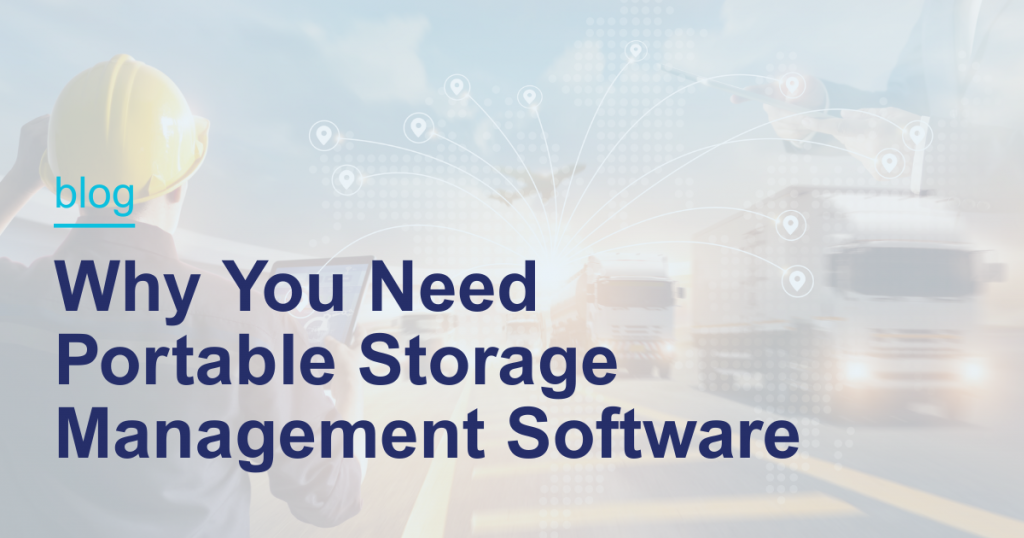If you run a portable storage, dumpster rental, trailer leasing, or modular space business, your inventory is the core of your operation. Without clear oversight of inventory – what you own, where it is, and how it’s being used – there is a risk of delays, lost revenue, and frustrated customers.
That’s where inventory management comes in.
In this post, we’ll cover the foundations of inventory management. What it is, why it matters, and how to make it work for your business.
What Is Inventory Management?
Inventory management is the process of tracking, organizing, and optimizing assets. From the moment they enter your operation to the moment they’re delivered, serviced, or retired.
For service-based industries like portable storage or roll-off rentals, “inventory” often means:
- Storage containers and trailers
- Dumpsters and roll-off boxes
- Modular classrooms or offices
- Specialized equipment like climate-controlled units
Effective management isn’t just knowing how many units you have, it’s knowing where each one is, who’s using it, and whether it’s generating revenue.
Why It Matters
Whether you’re operating a small fleet or thousands of units, good inventory management can:
- Prevent Loss and Misplacement. Every missing unit is lost revenue.
- Improve Scheduling and Dispatch. No more double-booking or sending the wrong size unit.
- Boost Utilization Rates. Keep assets in use instead of sitting in the yard.
- Streamline Billing. Ensure every deployed unit is properly invoiced.
- Improve Customer Service. Fast, accurate answers keep customers coming back.
Key Principles
1. Visibility Is Non-Negotiable
You should be able to check your system and instantly know:
- Which units are available
- Which are rented or in the field
- Which are due for pickup or maintenance
Pro Tip: If you rely on spreadsheets or phone calls to track, you’re already behind.
2. Accuracy Beats Assumptions
An inaccurate system is worse than no system at all. Keep data up to date by:
- Recording moves in real time
- Integrating dispatch and inventory tools
- Training staff on proper updates
3. Communication Keeps Things Moving
Data shouldn’t live in a silo. It should be accessible to sales, dispatch, yard staff, and management.
Everyone should be working from the same source of truth.
4. Efficiency Saves Time and Money
Software and systems should reduce manual work, not create more. Ideally, you can:
- Create a quote, schedule a delivery, and generate an invoice from one platform
- Pull reports instantly without exporting and reformatting data
- Onboard new employees quickly
5. Data Turns Into Decisions
Inventory management isn’t just about keeping track, it’s about spotting trends. Look at:
- Utilization rates
- Seasonal demand patterns
- Revenue per asset type
This insight helps decide when to buy more units, retire old ones, or shift resources.
Common Mistakes
Even well-run operations can get tripped up by:
- Overcomplicating the Process. Too many tools or steps lead to errors.
- Relying on Memory. “I think that unit’s in the yard” is not a strategy.
- Not Integrating Systems. Dispatch, billing, and inventory should talk to each other.
- Skipping Audits. Even the best systems need occasional physical checks.
How to Get Started
- Use Software. Don’t rely on spreadsheets or outdated methods.
- Integrate. Ensure systems integrate with other functions, such as dispatch and billing so updates are automatic.
- Training. Everyone should use the same process and systems.
In the Real World
For portable storage and modular space companies, the right system can be the difference between scrambling to find available units and running a smooth, profitable operation.
With inventory management tools and software like Omni~View, you can:
- Track every asset in real-time
- Manage dispatch, inventory, and billing in one place
- Digitally access your system
- Generate reports to keep your business moving forward
Graduate as an Inventory Management Pro
Inventory management isn’t a “set it and forget it” task, it’s an ongoing process. The more accurate, accessible, and efficient your system is, the healthier your business will be.


